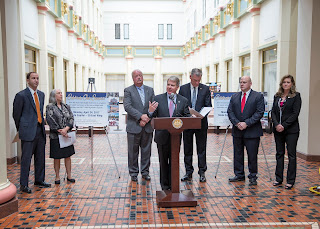Senator David G. Argall (R-29) thanked members of the task force for raising awareness of the problem of blight in communities of all sizes and for playing an instrumental role in helping municipalities deal with abandoned and dilapidated properties.
“Since this group was created in 2007, we’ve seen new laws created to provide stronger enforcement tools to municipalities so they can hold problem property owners accountable for allowing their property to fall into a dangerous state of disrepair, as well as laws to help municipalities to remediate blighted properties,” Argall said. “All of this progress is a direct result of the task force’s hard work over the past decade. Anti-blight laws are already having a positive impact in communities across the state, and I am hopeful we can continue to build on that success by exploring even more ways to tackle this problem.”
“I am looking forward to continuing the positive work of the Blight Task Force in my new role as the Chairman of the Senate Urban Affairs and Housing Committee,” said Senator Tom McGarrigle (R-26). “The task force has done some incredible work over the past couple of years which has benefited numerous Pennsylvanians. I plan to work closely with them and to work in a bipartisan and bicameral way to accomplish their legislative priorities.”
“Blighted properties are a problem in every corner of Pennsylvania. Through the Blight Task Force, Senator Argall has brought together legislators from both sides of the aisle and both chambers as well as stakeholders and community leaders to find solutions,” said Housing Alliance of PA Policy Director Cynthia Witman Daley. “The Blight Task Force is the legislative process at its best.”
Among other legislative priorities, the group is encouraging the creation of a new law to accelerate the foreclosure of abandoned and vacant properties. Under current law, it can take up to a year and a half to complete the foreclosure process. Legislation that has already been introduced in the Senate would reduce that time frame to no more than 240 days, and the House of Representatives’ Urban Affairs Committee is scheduled to consider a similar bill this week.
Members also expressed a desire to create a uniform legal definition of blight to ensure properties that meet that definition can be dealt with accordingly.
“The resolve to legislate a uniform definition of blight that will benefit Pennsylvania has been a truly bi-partisan effort,” said Department of Community and Economic Development Policy Director Steve D’Ettorre. “It has involved the Administration, Senate, and House of Representatives, as well as a number of key stakeholders.”

